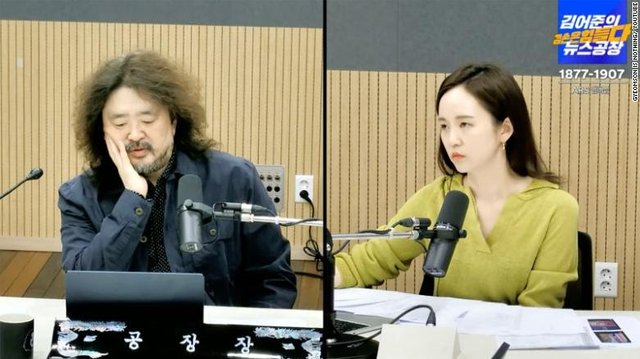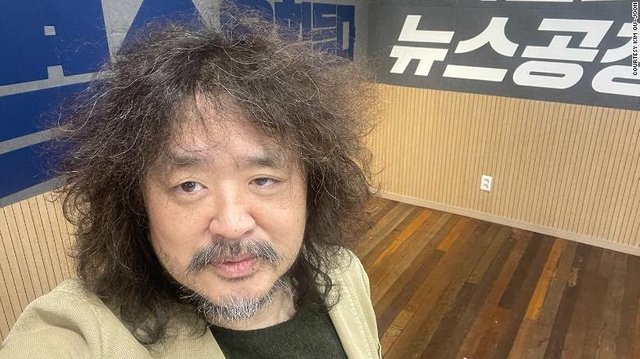
Seoul(CNN)YouTube's most watched daily live program in South Korea might surprise you. It is not about K-pop, it is not a K-drama, and has nothing to do with BlackPink.
It is a provocative current affairs talk show called "Gyeomson (Modesty) is Nothing," fronted by an irreverent host, Kim Ou-joon, whose lack of deference to authority is making waves in a country where traditional media has a reputation for respectful coverage.
Kim's style is reminiscent of a US late-night chat show host. Openly partisan, he says his aim is to counter-balance what he sees as a bias toward the conservative government with a liberal voice.
Kim's brash style stands out all the more given recently raised concerns by the US Department of State that South Korean officials are using defamation lawsuits to restrict freedom of expression.
It highlighted in a March human rights report the case of broadcaster MBC, which is being sued by the Foreign Affairs Ministry for a story in which it claimed the South Korean President Yoon Suk Yeol had been caught on a hot mic making less-than complimentary remarks about US lawmakers.
The presidential office has criticized the State Department report for "a lack of accuracy," claiming it had "simply collected and announced the claims of civic groups or media reports."
 Kim Ou-joon, the presenter and creator of the YouTube show "Modesty is Nothing," in his studio in Seoul.
Kim Ou-joon, the presenter and creator of the YouTube show "Modesty is Nothing," in his studio in Seoul.
But taking on the conservative administration doesn't faze Kim, who has been sued for defamation on several occasions.
Kim's critics meanwhile say his taste for controversy goes only one way, accusing him of paying less attention to reports involving the liberal Democratic Party.
Political influencers
Still, the show's reputation for daring to go where others fear to tread has done wonders for its viewing figures. Every morning at 7:05 a.m., about 160,000 people tune in to hear Kim's takes on the biggest issues of the day.
Industry observers say the program's popularity -- it has more than 1 million subscribers and can rake in donations of 90 million won ($70,000) a day -- reflects a changing media landscape.
Increasingly, they say, current affairs programs are turning to YouTube to disseminate their content, drawn both by large audiences and the perception that the online arena grants greater space for freedom of expression.
"Modesty is Nothing," for instance, is the reincarnation of a radio show called "News Factory" that was taken off air after a row with the government.
YouTube has a high penetration in South Korea. According to Statista, a market and consumer data statistics site, there were over 46 million YouTube users in South Korea as of January this year -- more than 90% of the population (compared to over 70% in the United States).
persuasions -- like the right-wing Tubeshin (1.46 million subscribers) and the left-wing Newstapa (over 1 million).

ouTube's growing influence was demonstrated in the run-up to last year's general election, when Yoon -- then a candidate for the People Power Party -- saw his popularity fall following a stumbling performance in a Christmas Day YouTube interview with 3ProTV.
Before the show he had been neck-and-neck with opponent Lee Jae-myung from the (then ruling) Democratic Party of Korea; soon after a Gallup survey showed him trailing by around 8% points.
The clout of both right and left-wing channels has also been shown in recent movements. Right-wing channels fueled rallies in support of the former President Park Geun-hye after she was impeached in 2017 over a corruption scandal; they also backed protests outside the retirement home of her liberal successor Moon Jae-in. Left-wing channels backed counter-rallies outside the current President Yoon's home.
Last year the former leader of Yoon's party hit out at what he said was the "evil influence" of YouTube channels.